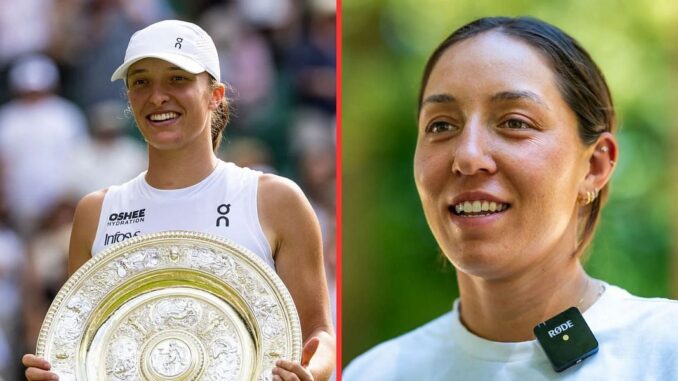
In a twist of fate that underscores the unpredictable nature of tennis, Jessica Pegula’s encouraging words to Iga Swiatek just weeks before the 2025 Wimbledon Championships proved prophetic, as the Polish star stormed to her first-ever title on the hallowed grass courts of SW19. Pegula, the world No. 4, revealed in a pre-tournament press conference at the 2025 Mubadala Citi DC Open in Washington that she had given Swiatek a morale-boosting pep talk after their thrilling clash in the Bad Homburg Open final, where Pegula emerged victorious in straight sets, 6-4, 7-5. Little did she know that her words would fuel Swiatek’s remarkable run to her sixth Grand Slam title, a feat that left Pegula both amused and reflective. “So it was kind of funny that she ended up winning Wimbledon,” Pegula said, chuckling at the irony. “I was, like, of course I said that, and we had that moment, and then she wins Wimbledon, but that’s just tennis for you.”
The Bad Homburg final, played just days before Wimbledon, was a high-octane battle that showcased both players’ potential on grass. Pegula, who claimed her second career grass-court title and third of the 2025 season, noticed a significant improvement in Swiatek’s game, particularly her serve. “I thought she was serving a lot bigger,” Pegula observed, noting that Swiatek unleashed nine aces during their match, a stark contrast to her usual clay-court dominance. “She was playing good tennis and beat good grass-court players. I thought our final was a reallyWi high level. It was super close.” Despite the loss, Swiatek’s performance in Germany hinted at a breakthrough, especially after she crushed top-10 player Jasmine Paolini in the semifinals, marking her first victory over a top-10 opponent on grass.
Swiatek, a four-time French Open champion and former world No. 1, has long been dubbed the “Queen of Clay” for her unparalleled success on the red dirt, including a 2024 Roland Garros title. Yet, grass had been her kryptonite, with her best Wimbledon result prior to 2025 being a quarterfinal appearance in 2023. Her struggles on the slick surface often left her doubting her abilities, a sentiment she openly shared. Pegula, however, saw past Swiatek’s self-criticism during their post-match exchange in Bad Homburg. “You know, she is always kind of down on herself about grass, and I was, like, ‘Hey, you’re playing really good on grass. I’m not really sure why you think you’re bad on grass or what it is,’” Pegula recounted. Her words of encouragement, delivered during the trophy ceremony, were a call for Swiatek to “cut herself some slack,” a message that resonated deeply.
Swiatek’s Wimbledon campaign was nothing short of extraordinary. The No. 8 seed, who had slipped to world No. 4 after reaching the Bad Homburg final, dropped just one set en route to the title, culminating in a historic 6-0, 6-0 demolition of American Amanda Anisimova in the final—the first women’s Wimbledon final to end in a double bagel in over a century. “Honestly, I didn’t even dream of winning Wimbledon because for me it was just way too far,” Swiatek admitted in her on-court interview, her disbelief palpable. “I feel I’m already an experienced player after winning Slams before, but I never really expected this one.” Her triumph, which followed a year of challenges, including a one-month doping ban in late 2024 for a contaminated heart medication, marked a turning point, proving her adaptability and resilience.
For Pegula, the contrast couldn’t have been starker. After her Bad Homburg triumph, she entered Wimbledon as the No. 3 seed, brimming with confidence. Yet, her campaign ended abruptly with a shocking перш-round loss to Italy’s Elisabetta Cocciaretto, 6-2, 6-3, in just 58 minutes. “This is definitely probably the worst result I’ve had all year,” Pegula admitted, reflecting on the defeat. Despite the setback, she processed the loss quickly, noting, “It was almost like I got killed so bad that you’re kind of just like, okay, just flush that one and move on.” Her ability to maintain perspective, coupled with her recognition of Swiatek’s grass-court potential, highlights her sportsmanship and keen understanding of the game.
Swiatek’s Wimbledon victory was a testament to her off-season work with new coach Wim Fissette, who focused on refining her serve and movement on grass. “I feel like I have developed as a player and I had time to practice a little bit more [this year],” Swiatek said, crediting her team’s belief in her. Pegula’s pep talk, though a small moment, played a role in shifting Swiatek’s mindset, helping her shed her doubts and embrace the grass. As Swiatek now prepares for the Canadian Open, aiming to close the gap on world No. 1 Aryna Sabalenka, Pegula continues her quest for a maiden Grand Slam title at the US Open, where she reached the final in 2024. The tennis world, ever unpredictable, thrives on moments like these—where a few words of encouragement can spark a historic triumph.
Leave a Reply